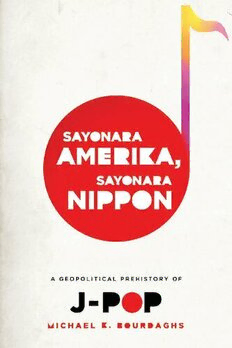
Sayonara Amerika, Sayonara Nippon: A geopolitical prehistory of J-pop PDF
Preview Sayonara Amerika, Sayonara Nippon: A geopolitical prehistory of J-pop
SAYONARA AMERIKA, SAYONARA NIPPON ASIA PERSPECTIVES: HISTORY, SOCIETY, AND CULTURE ASIA PERSPECTIVES: HISTORY, SOCIETY, AND CULTURE A Series of the Weatherhead East Asian Institute, Columbia University CAROL GLUCK, EDITOR Comfort Women: Sexual Slavery in the Japanese Military During World War II, by Yoshimi Yoshiaki, trans. Suzanne O’Brien The World Turned Upside Down: Medieval Japanese Society, by Pierre François Souyri, trans. Kathe Roth Yoshimasa and the Silver Pavilion: The Creation of the Soul of Japan, by Donald Keene Geisha, Harlot, Strangler, Star: The Story of a Woman, Sex, and Moral Values in Modern Japan, by William Johnston Frog in the Well: Portraits of Japan by Watanabe Kazan, 1793–1841, by Donald Keene The Modern Murasaki: Writing by Women of Meiji Japan, edited and translated by Rebecca L. Copeland and Melek Ortabasi So Lovely a Country Will Never Perish: Wartime Diaries of Japanese Writers, by Donald Keene SAYONARA A M E R I K A , SAYONARA N I PPON A GEOPOLITICAL PREHISTORY OF J-POP MICHAEL K. BOURDAGHS Columbia University Press New York Columbia University Press wishes to express its appreciation for assistance given by the Northeast Asia Council of the Association for Asian Studies toward the cost of publishing this book. COLUMBIA UNIVERSITY PRESS Publishers Since 1893 New York Chichester, West Sussex cup.columbia.edu Copyright © 2012 Columbia University Press All rights reserved Library of Congress Cataloging-in-Publication Data Bourdaghs, Michael K. Sayonara Amerika, sayonara Nippon : a geopolitical prehistory of J-pop / Michael K. Bourdaghs. p. cm. —(Asia perspectives) Includes bibliographical references and index. ISBN 978-0-231-15874-9 (cloth : alk. paper) ISBN 978-0-231-15875-6 (pbk. : alk. paper) ISBN 978-0-231-53026-2 (e-book) 1. Popular music—Japan —History and criticism. I. Title. ML3501.B69 2012 781.630952—dc23 2011029162 Columbia University Press books are printed on permanent and durable acid-free paper. This book is printed on paper with recycled content. Printed in the United States of America c 10 9 8 7 6 5 4 3 2 1 p 10 9 8 7 6 5 4 3 2 1 References to Internet Web sites (URLs) were accurate at the time of writing. Neither the author nor Columbia University Press is responsible for URLs that may have expired or changed since the manuscript was prepared. FOR RONALD BOURDAGHS (1937–2010) (cid:2)(cid:3) CONTENTS ACKNOWLEDGMENTS(cid:2)IX A NOTE ON NAMES AND THE TRANSLATION(cid:2)XIII INTRODUCTION 1 1 THE MUSIC WILL SET YOU FREE Kurosawa Akira, Kasagi Shizuko, and the Road to Freedom in Occupied Japan 11 2 MAPPING MISORA HIBARI Where Have All the Asians Gone? 49 3 MYSTERY PLANE Sakamoto Kyū and the Translations of Rockabilly 85 4 WORKING WITHIN THE SYSTEM Group Sounds and the Commercial and Revolutionary Potential of Noise 113 5 NEW MUSIC AND THE NEGATION OF THE NEGATION Happy End, Arai Yumi, and Yellow Magic Orchestra 159 6 THE JAPAN THAT CAN “SAY YES” Bubblegum Music in a Postbubble Economy 195 CODA(cid:3)223 NOTES(cid:2)229 INDEX(cid:2)275 ACKNOWLEDGMENTS T his book took fourteen years to write. It was only after I had already been working on it for several years that I even realized I was writing a book on Japanese pop. As a result of this unnaturally prolonged gestation, the project became so entangled with the threads of my life that it is difficult now to trace its chapters back to clearly defined starting points. This makes providing adequate acknowledgments here a challenging task. In a very real sense, everyone who has been a part of my life the past decade and a half deserves a share in the credit: thank you. In part, the book began with a panel I organized on Japanese popular music for the 1997 Association for Asian Studies (AAS) annual meeting. My fellow panelists—Mark Anderson, Leo Ching, Brett de Bary, Joanne Izbicki, and the late Miriam Silverberg— shared their insights on popular music and gave me valuable feed- back on my own work. My paper for the panel was based on research funded in part by grants from the UCLA Center for Japanese Stud- ies and the AAS Northeast Asia Council. Thanks to Barbara Claire Freeman, that paper appeared as “The Japan That Can ‘Say Yes’: Bubblegum Music in a Post-Bubble Economy,” Literature and Psy- chology 44, no. 4 (1998): 61–86. A revised version is included here as chapter 6. Mark Anderson’s paper at that AAS panel introduced me to the music of Happy End and started me down a pathway that eventu- ally led to another section of this book. It began with a paper I pre- sented at the International Conference on Monuments and Memory
